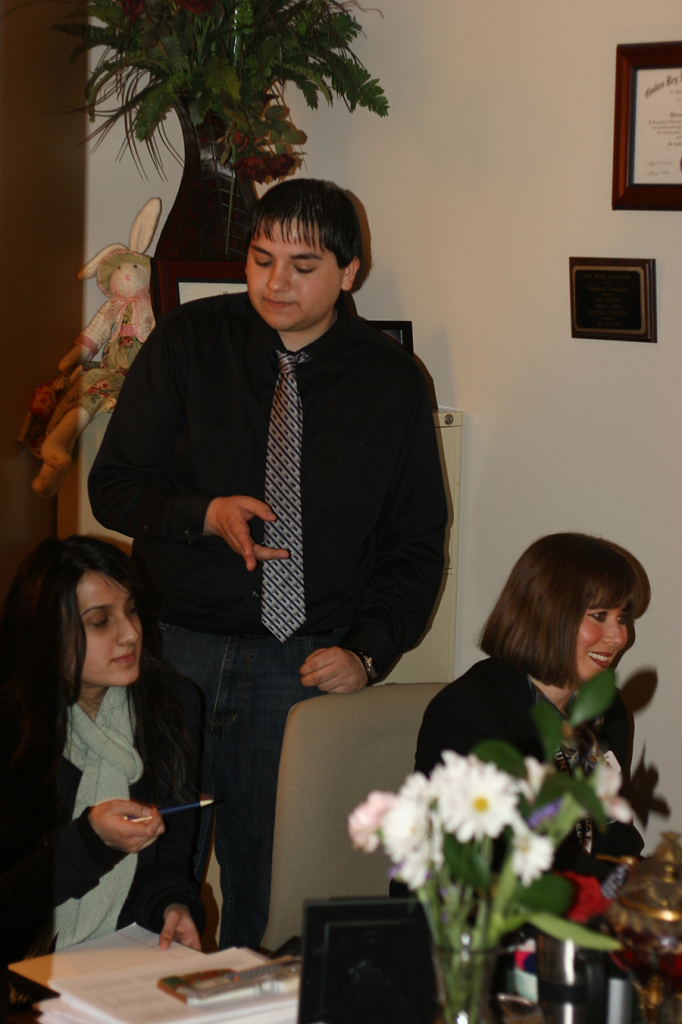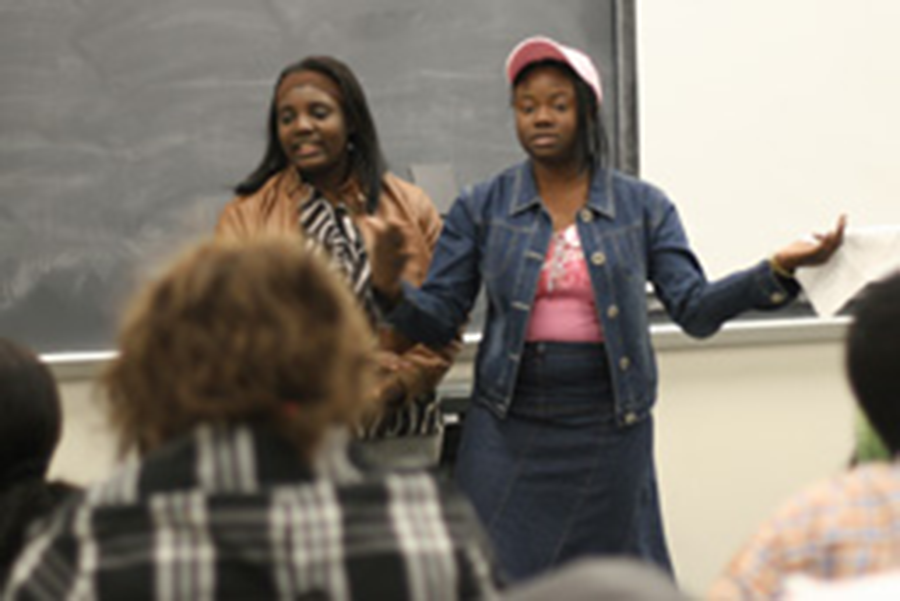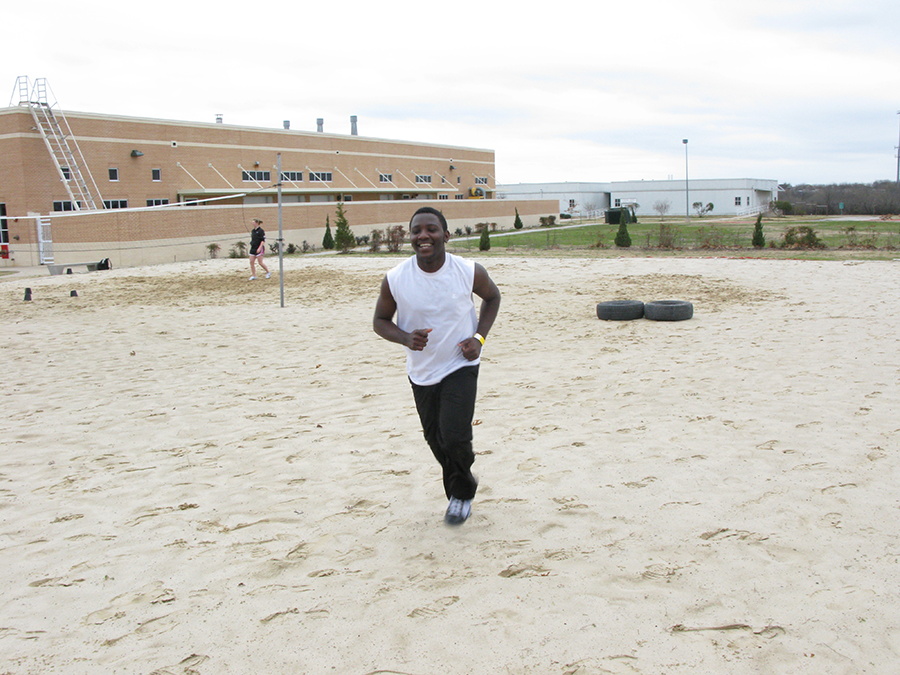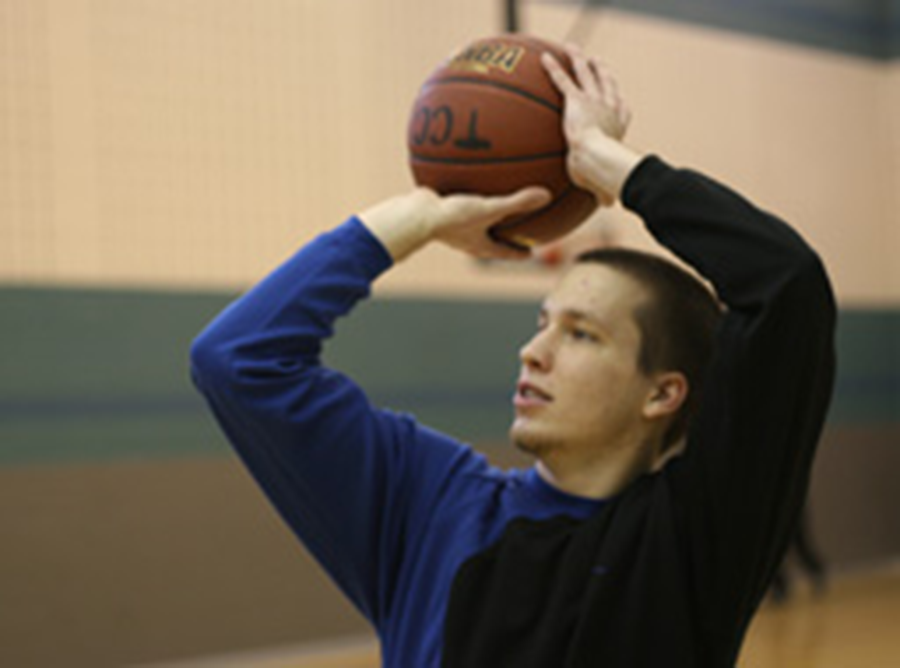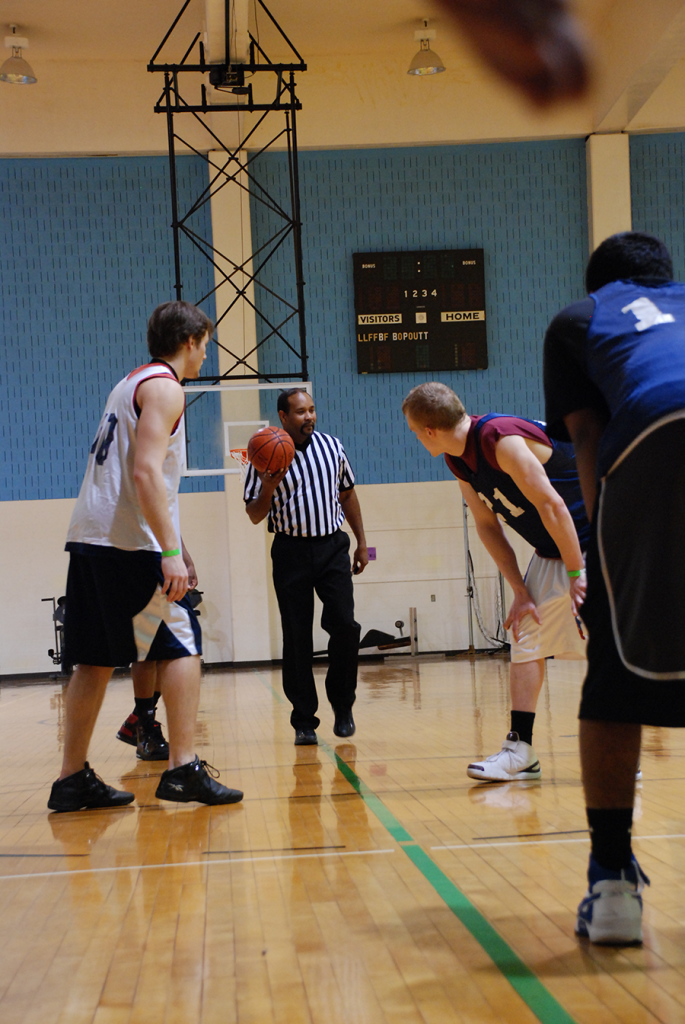By Shelly Williams/editor-in-chief
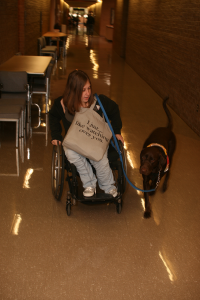
Casey Holder/The Collegian
She calls to her, whistling her companion’s name.
But Truffles has other intentions and pulls the leash toward a smell under the table instead of listening to NE Campus student Samantha Ross telling her to heel.
Born with spina bifida, meteorology major Ross has always struggled to walk. It became permanent in fourth grade after her muscles froze when she developed scoliosis. Since then, she’s found a friend and helper in Truffles from the time the chocolate lab was 7 weeks old. The dog is now almost 2 years old and assists Ross to and from her classes throughout the day at TCC.
On a good day, it takes Ross and Truffles three to five minutes to get from one class to another. Truffles also helps Ross whenever Ross drops something on the floor by clamping her teeth around the fallen object and handing it back to her owner. She’ll also open doors for Ross.
“If it has a little handicap button on it, she can jump up and push it,” Ross said. “But she’s still learning.”
Despite Truffles’ service duties, Ross said her dog still acts very young.
“She loves to play Frisbee and play tug,” she said. “She’s pretty much your average 2-year-old puppy.”
But in a classroom setting, Ross said Truffles becomes well-behaved and doesn’t act like the playful puppy she is at home.
“Most people don’t even know she’s there,” Ross said. “They look at me and are like, ‘Oh, a dog.’ They’re actually really accepting of her. If someone does have an issue, like if they’re allergic to dogs or are afraid of dogs, then I’ll try my best to keep her away from them.”
Ross’ friend at TCC and high school peer, NE student Becky Bouvier said that Ross didn’t have Truffles back then.
“During high school, I don’t know if they allowed it or if Truffles wasn’t trained enough to go to the high school and help her,” she said. “It’s a little distracting but not too much.”
However, Truffles has a stubbornness about her that’s easy to see around campus, Ross said. When the weather changes, Truffles sometimes will decide that helping Ross isn’t on her agenda for the day, she said.
“That’s when I notice her behavior changing,” she said. “She’s stubborn and doesn’t want to do anything. If she hasn’t been working for a day or two, if it’s been raining, then she doesn’t want to work, and she’s got to get used to it again, and I have to adjust to that.”
Ross said she sometimes must quickly adjust when Truffles becomes distracted and finds something else that catches her brown, curious eyes.
“Most of the time it’s just using force with her, like an authoritative voice,” Ross said as she called her dog’s name again and tugged on Truffles’ leash to keep her curiosity in check. “Sometimes I have to tug on the leash a lot more. Truffles, you come here.”
Once a week, Ross takes Truffles in her car to training. As in any car ride, Truffles acts like any dog in a car, she said.
“It’s just me, my mom, Truffles,” she said. “We go to our trainer’s house and work skills like picking up things or retrieving something.”
For the first few weeks, Truffles learned good citizenship in public. Ross said it was a different experience because she’s never had a dog before Truffles.
Independent cats? Yes.
A Labrador retriever that depended on her? No.
“She’s more dependent on me,” she said. “I’m used to more independent animals. So that was very strange for me. It’s a learning process for both of us. We’re still trying to figure out what we can do and what we can’t do.”
The pair share bonding time together by playing after school and going for walks between classes so Truffles can get her energy out, she said. The two often play catch unless Truffles decides not to bring the toy back to Ross.
However, sometimes Truffles’ mind of her own can lead her on random excursions.
“She got loose. I had to walk all the way down behind our house. She wouldn’t come back to me,” Ross said. “She was being stubborn that day. I was like, ‘You can’t do that.’ I had to punish her for that, but she forgot about it, and we were OK after that.
“She’s easily distracted, and I have to keep her focused. If there’s a squirrel or something, she’ll go from service mode to dog mode. There’s nothing you can do about it. You just have to let her get it out of her system. She may not come back instantly, but she’ll realize ‘Whoa, I’m doing something wrong’ and turn around and come back. Or if I get hurt, she’ll turn around and come back.”
Despite Truffles’ friendly nature, Ross advises students not to pet her helper for safety precautions. She said it could be dangerous for the person in the wheelchair, the dog and the person petting the dog if Truffles becomes scared or startled for some reason.
Ross said she’s become more protective lately and has developed a new and loud habit while they wait outside of a classroom.
“The first time she did it, she scared me because I didn’t know what she was doing,” she said about Truffles’ barking. “We now have to use a squirt bottle with vinegar to control it. She’s getting better already.”
Ross carries the squirt gun with her but has forgotten it several times. However, if Truffles sees the bottle or if it’s mentioned, she’ll stop almost immediately.
“The first day, I had a teacher come out and ask if everything was OK,” she said. “I had to tell her that I had everything under control. It was very loud barking. I didn’t realize she was going to do that. I think she got scared is what it was, so she was just trying to protect me and herself.”
Ross said it’s just part of the process of Truffles getting used to other people around her and that it’s OK.
NE assistant professor of history and philosophy Anne Rye said Truffles tries to get to know people in class.
“I just treat her [Ross] like any other student,” she said. “Sometimes the dog wants to get up. I walk over there by her, and I sometimes have to stop and pet her for a minute, but it’s fine. It’s perfectly normal.”
Before wheels replaced her feet, Ross had love for a different animal — horses. She once rode them all the time, but since her diagnosis, she has discovered other ways to fill her time.
She found she could dance in her wheelchair and even joined her high school drill team.
When college arrived, the dancing stopped.
“Now, I don’t do anything just because I don’t have time with school and everything else I’ve got going on,” she said. “But I’d love to get back into dancing, and I know Truffles would be right there with me.”


























